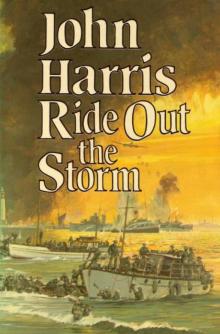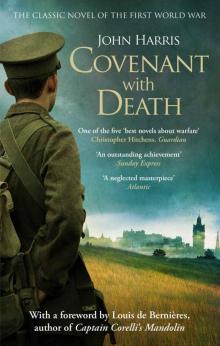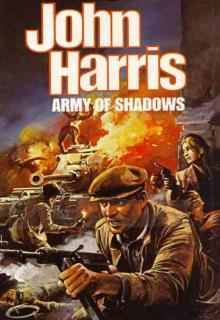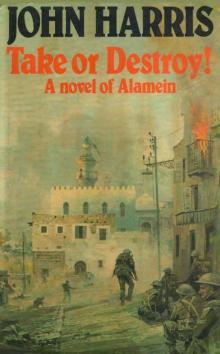- Home
- John Harris
Flawed Banner
Flawed Banner Read online
Copyright & Information
Flawed Banner
First published in 1991
Copyright: Juliet Harris; House of Stratus 1991-2011
All rights reserved. No part of this publication may be reproduced, stored in a retrieval system, or transmitted, in any form, or by any means (electronic, mechanical, photocopying, recording, or otherwise), without the prior permission of the publisher. Any person who does any unauthorised act in relation to this publication may be liable to criminal prosecution and civil claims for damages.
The right of John Harris to be identified as the author of this work has been asserted.
This edition published in 2011 by House of Stratus, an imprint of
Stratus Books Ltd., Lisandra House, Fore Street, Looe,
Cornwall, PL13 1AD, UK.
Typeset by House of Stratus.
A catalogue record for this book is available from the British Library and the Library of Congress.
EAN ISBN Edition
0755102398 9780755102396 Print
0755127404 9780755127405 Mobi/Kindle
0755127684 9780755127689 Epub
This is a fictional work and all characters are drawn from the author’s imagination.
Any resemblance or similarities to persons either living or dead are entirely coincidental.
www.houseofstratus.com
About the Author
John Harris, wrote under his own name and also the pen names of Mark Hebden and Max Hennessy.
He was born in 1916 and educated at Rotherham Grammar School before becoming a journalist on the staff of the local paper. A short period freelancing preceded World War II, during which he served as a corporal attached to the South African Air Force. Moving to the Sheffield Telegraph after the war, he also became known as an accomplished writer and cartoonist. Other ‘part time’ careers followed.
He started writing novels in 1951 and in 1953 had considerable success when his best-selling The Sea Shall Not Have Them was filmed. He went on to write many more war and modern adventure novels under his own name, and also some authoritative non-fiction, such as Dunkirk. Using the name Max Hennessy, he wrote some very accomplished historical fiction and as Mark Hebden, the ‘Chief Inspector’ Pel novels which feature a quirky Burgundian policeman.
Harris was a sailor, an airman, a journalist, a travel courier, a cartoonist and a history teacher, who also managed to squeeze in over eighty books. A master of war and crime fiction, his enduring novels are versatile and entertaining.
A Quote
‘Dead scandals form good subjects for dissection.’ - Byron
Author’s Note
Parts of this book are true. I am indebted for details to William Clive’s Fighting Mac (Macmillan, 1977).
Part One
One
‘Ever heard of Fighting Mac?’ Pullinger asked.
James Woodyatt shook his head. ‘Who’s he? An up-and-coming prize-fighter?’
Pullinger frowned and lit a cigarette. ‘Not exactly,’ he said. ‘He died thirty-seven years ago – to the day almost. March 25, 1903, to be exact. Just about the time when I first went to infants’ school, when Hubert James Woodyatt was making his debut in his mother’s arms, and not very long after distinguishing himself in a far better war than the one we’ve got now.’
Woodyatt glanced through the window. In his line of sight, hanging over the roofs, was a barrage balloon fat and floppy, tugging at its wire in the breeze. Below it, every door and window in Whitehall was ‘bricked up’ with sandbags, and all the passers-by wore ineffectual-looking little cardboard boxes on string containing their gas masks. Unless they contained their make-up or lunch, which they all too often did.
Pullinger was right. In the early spring of 1940 the war in England still had a shockingly amateur look about it. After Poland had been invaded British troops had taken up positions alongside their French allies on the continent but, with the Germans between them and the Poles they had promised to save, there was little they could do and, as though baffled, they had simply sat down to wait for something to happen.
Woodyatt prodded. ‘This Fighting Mac,’ he reminded. ‘Who is he?’
Pullinger looked up. ‘He was a soldier,’ he said. He was inclined to be self-important and loved to make mysteries. His was one of the multifarious little departments connected to Intelligence that had sprung up since hostilities had commenced in September the previous year. It seemed to exist on a shoestring, with two or three rooms and one or two intellectuals drafted into the job against their will. There were also one or two women to do the typing, make the tea and provide dalliance for the intellectuals. And there was one very smart piece of work, who looked like a female staff officer in mufti, who acted as Pullinger’s liaison with somebody at the War Office. She was divorced and, Woodyatt believed, was Pullinger’s companion on jaunts to the country on weekends when nothing was happening. Her name was Almira Hannah and Pullinger always referred to her by her surname. Woodyatt felt she probably encouraged it.
The department seemed to exert a surprising amount of pull. Woodyatt put it down to the fact that British Intelligence was bad, that nobody knew a damn thing about anything, and that the creation of these little enclaves was the reaction to the fact that they possessed nothing in the way of weapons and nobody was doing much to provide them.
‘Hadn’t you better tell me more about this Fighting Mac?’ he suggested.
Pullinger nodded. ‘Take a pew. Cigarette? I think we’ll have a drink while we’re at it too. It’ll help us digest it.’
‘Is it that indigestible?’
‘On the whole, yes, it is.’ Pullinger picked up the telephone and a minute or two later the elegant Hannah appeared with a tray. She smiled at Woodyatt and gave Pullinger a look that obviously meant a lot to them both but was supposed to mean nothing to anyone else.
Pullinger leaned over the table as she vanished. ‘Sherry? Whisky? Gin?’
While Pullinger was busy at the tray, Woodyatt glanced at the situation map on the wall. The bomber attacks which had been expected to wipe out half London had not materialised and the cardboard coffins stacked in swimming baths ‘closed for repairs’ had not been needed. On the other hand the months, like the year the Prime Minister – Chamberlain – had gained through the Munich agreement with Hitler, had been wasted in lethargy and inactivity. The attitude among the woolly minded men at Westminster seemed to be that an inefficient army was more moral than an efficient one, and there had been a feeling that if they didn’t bother about it too much the war would go away.
Unfortunately, it hadn’t. While nobody was looking, German troops had descended on Denmark and Norway; and Britain and France, rushing to help, were at that moment trying to avoid being flung back into the sea. A Norwegian politician called Quisling was making it more difficult by proclaiming himself Prime Minister and telling the Germans he was on their side.
Though press hand-outs and a sacrificial naval engagement had seemed at first to indicate victory, in fact the British had been caught totally unprepared. The magnificent weather had aided and abetted the impression. It had been one of the best holiday periods ever for seaside landladies. Eager visitors to the East Coast resorts sat on the front and cocked their ears hoping for the sound of naval gunfire from the North Sea, where they imagined the Royal Navy was knocking spots off the Germans.
The invasion of Scandinavia had thrown the government – mostly old men who had gone to war worried about shedding blood – into confusion. Yet even now, with the allied troops backtracking towards the Norwegian coast as fast as they could manage, Parliament still maintained its leisurely debates, people still went to the theatre and football matches, and the newspapers still seemed more concerned with the approaching cr
icket season than they were with the progress of the fighting. It was a lousy war really.
Pullinger was pushing a glass across to Woodyatt. The two men might almost have been brothers, both tall, lean-faced and intelligent looking, the only difference being that Pullinger was older, smoother and more self-satisfied. He was a Regular Army Officer who had served in France as a youth in the other war. Woodyatt had been recruited from Fleet Street and had donned uniform willingly enough because his marriage had collapsed and the secretive nature of the job suited him down to the ground.
‘During the last war in the trenches,’ Pullinger remembered, ‘instead of a little whisky and a lot of water, we drank a lot of whisky with a little water. It took the taste away.’
‘My brother Tom’s up near the Belgian border,’ Woodyatt said. ‘He’s billeted with a couple of elderly ex-prostitues. He says they feed him well. He’s having the time of his life.’
‘Tell him to make the most of it.’
‘You think something’s coming?’
Pullinger smiled. ‘Spring, I reckon.’
‘You were talking about Fighting Mac.’
‘Yes. Make yourself comfortable. This is going to take quite a while. Fighting Mac–’ Pullinger drew a deep breath ‘–real name Sir Hector MacDonald. Not a very popular man with his contemporaries.’
‘Martinet?’
‘No. Sound enough with the troops. But he was the son of a Scottish crofter who enlisted in the Gordon Highlanders and by sheer merit and totally without influence or help, rose to the rank of major-general and was eventually knighted and appointed aide to Queen Victoria. She loved chaps in kilts.’ Pullinger paused. ‘As a commander not outstanding,’ he went on. ‘But then, with a few exceptions like Roberts and Wolsely, neither was anybody else in that day and age. In the second Boer War he was given the Highland Brigade when their commanding officer was killed. As a hero, he duly got his portrait on cigarette cards, and in newspaper headlines and boys’ magazines.’
Woodyatt wished he would cut out the sarcasm. As a newspaperman he was certain a story was about to come up but it seemed to be taking a long time to surface.
‘Around 1903 he was given command of all British troops in Ceylon,’ Pullinger continued. ‘Good jumping-off place where things could go sadly wrong. You see, he’d developed a few odd tendencies over the years and it reached the ears of the authorities that he was involved with a known homosexual. Enquiries were made and, rather than face the music, he committed suicide.’
‘And this affects us?’ Woodyatt asked. ‘In 1940?’
‘Hold your water. We’ll come to it eventually.’ Pullinger frowned. He seemed to find the story wearing because he filled his glass again and pushed the bottle across. ‘The body was brought home and buried in Edinburgh and that was that. People have argued about it ever since.’
‘Why?’
Pullinger’s shoulders moved. ‘People refused to believe he was dead. You know the way it goes. People like their heroes alive. It was said he’d gone on a secret mission for the government, that he’d been murdered, even that he’d been seen at the unveiling of a monument to him in Dingwall in 1907. Other people claimed to have met him as a general in the Japanese army. In 1916 Scottish soldiers on the Somme said they saw him in French uniform. One story was that he’d turned up as the German Field Marshal von Mackensen.’ Pullinger waved a languid hand. ‘Rubbish, of course. All of it. But now we get to the nub of the matter. There was another.’
‘Another what?’
Pullinger’s face changed. ‘Another Fighting Mac,’ he said sharply.
‘What’s that supposed to mean?’
‘Well, he wasn’t called MacDonald and he wasn’t a Highlander. But there was another case. About the same time, too. Very off-putting.’
‘Soldier?’
‘Oh, yes. Very much so. These people aren’t all greenery-yallery types like Oscar Wilde. Take Richard the Lionheart, for example.’
‘And this other one?’
‘Obliterated, of course. Deleted. Rubbed out. The Army List doesn’t show his name after 1904. But you’ll find him all present and correct until then. Because it came so soon after MacDonald, the case was hushed up. Even Edward VII co-operated. He was very worried, of course. His assistant equerry, Lord Arthur Somerset, had been linked to a homosexual scandal in 1889, you see; and so had his son, the Duke of Clarence, so he wasn’t very keen to have these cases exposed. And like MacDonald, this other chap had also been an aide to the old Queen, and two in eighteen months was just too much. People were going to start wondering what these types were doing in the army and what the Royal Family were doing to choose them as aides.’
Pullinger sat back, sank his whisky, shoved a few papers around on his desk and looked up. ‘You’d have thought he’d have been a bit more careful, wouldn’t you?’ he went on. ‘But perhaps it’s part of the character. There was that chap, Redl, Chief of Austrian Intelligence in 1913. Sold secrets to the Russians because he was being blackmailed as a homosexual. He felt he could get away with it but they caught him over something quite trivial.’
‘Was our chap – this chap you’re talking about – being blackmailed?’
Pullinger lit another cigarette. His frown had grown deeper.
‘Hang on,’ he urged. ‘Take it in the right order. Like MacDonald – like Redl, come to that – he was good-looking, caused a few sighs in London boudoirs.’
‘How do you know?’
Pullingers face was blank. ‘I heard,’ he said.
Woodyatt was wondering where it was all going to lead.
‘Hadn’t we better have a name?’ he suggested. ‘Instead of arsing about talking about “this chap” and so on.’
Pullinger frowned, then he shrugged. ‘You can find that out for yourself,’ he said. ‘I’ve dug out the files on the affair for you to look at. Took a bit of getting, but they eventually gave permission.’
‘Who did?’
‘High altar. Chief of Staff. Prime Minister. Take your pick.’
‘Why did it require so much weight?’ Woodyatt asked. ‘For God’s sake, it took place thirty-six years ago, you said. Why are we so interested all of a sudden?’
Pullinger gestured. ‘Suppose you go and sniff through them, then I’ll tell you.’
Woodyatt frowned. ‘Do I expect to find something?’
Pullinger gave a bark of mirthless laughter. ‘I reckon you might,’ he said.
Two
Major-General Sir George Surtees Redmond.
For the first time, Woodyatt had a name. It meant nothing to him and he could only assume that, apart from his disgrace, Redmond hadn’t made much mark on the world’s tapestry. But a man who had enlisted as a private soldier, served through the first and second Boer Wars and on the North-West Frontier, to say nothing of a host of minor wars before finally reaching senior rank in the days when influence counted more than skill, could hardly be said to be of no account. It was all there. He had been born near Harrogate in Yorkshire in 1861, into the family of a farmer, but had immediately been taken into the home of a family possessed of a minor title. The inference was obvious. Redmond had been sired either by the owner of the title or one of his sons. He had been educated privately – doubtless to avoid wagging tongues – by a governess and then by a tutor; but then, following some dispute with the family, had cut himself off from them and enlisted in one of the country’s regiments. He had risen quickly through the ranks and been granted a commission just before the first Boer War in which, having distinguished himself – one of the few who had – he received a quick step up in promotion.
About this time, because his childhood governess had happened to be half-German and he had developed an ability to speak that language, he found himself eligible for an inter-change German language course through the German staff college at Potsdam. He applied for it and got it. He was obviously clever with a gift for languages and, in addition to German, he had also learned to write and speak French. By
the outbreak of the second Boer War in South Africa in 1899 he had become a brigadier and the early disasters there and the subsequent sacking of senior officers had made him a major-general.
He had done well. One senior officer had written of him: ‘Highly intelligent and well read. A born staff man.’ Another had said ‘In action, very reliable.’ But there was one other, who disagreed. ‘Too clever by half,’ he had said.
As Pullinger had suggested, it hadn’t been a vintage period for British generalship but it seemed Redmond had always had the ability to inspire the ordinary rank and file to stand fast when standing fast was important, and to go forward without hesitation when that was the order of the day. In 1904, still a bachelor, he was appointed commander of all British troops in Upper Burma with a seat on the Legislative Council.
Those were the facts according to the copy of the entry for Who’s Who of 1904 which lay on top of the file. So far, it was all straightforward. After that point, however, the file entries seemed to consist of copies of reports, newspaper cuttings, and comments. In March, 1904, Redmond had been asked to report to the office of the Governor of Upper Burma who had sent to the Foreign Office a report indicating in close detail exactly what had been said between them. A copy of it now lay in front of Woodyatt.
‘It has come to my knowledge, Sir George,’ the Governor had said to Redmond, ‘that a very grave accusation has been made against you. So grave I find it hard to decide exactly what to do.’
There had been more in the same strain, with the Governor, a gentleman by the name of Sir Horace Varah, showering clichés and platitudes about failing in his duty if he didn’t allow the accused to make some comment. Apparently, Redmond had not answered and Sir Horace had produced a sheet on which he had written down all the details of the accusation. ‘I found them most unpalatable,’ he had commented in his report to the Foreign Office.

 China Seas
China Seas The Mercenaries
The Mercenaries Road To The Coast
Road To The Coast The Thirty Days War
The Thirty Days War The Old Trade of Killing
The Old Trade of Killing Ride Out The Storm
Ride Out The Storm Corporal Cotton's Little War
Corporal Cotton's Little War Fox from His Lair
Fox from His Lair Paint The Rainbow
Paint The Rainbow Flawed Banner
Flawed Banner Covenant with Death
Covenant with Death So Far From God
So Far From God The Sea Shall Not Have Them
The Sea Shall Not Have Them The Cross of Lazzaro
The Cross of Lazzaro Smiling Willie and the Tiger
Smiling Willie and the Tiger Harkaway's Sixth Column
Harkaway's Sixth Column The Sleeping Mountain
The Sleeping Mountain The Claws of Mercy
The Claws of Mercy North Strike
North Strike Picture of Defeat
Picture of Defeat Army of Shadows
Army of Shadows Right of Reply
Right of Reply Getaway
Getaway The Lonely Voyage
The Lonely Voyage Take or Destroy!
Take or Destroy! The Backpacker
The Backpacker A Funny Place to Hold a War
A Funny Place to Hold a War Swordpoint (2011)
Swordpoint (2011) A Kind of Courage
A Kind of Courage